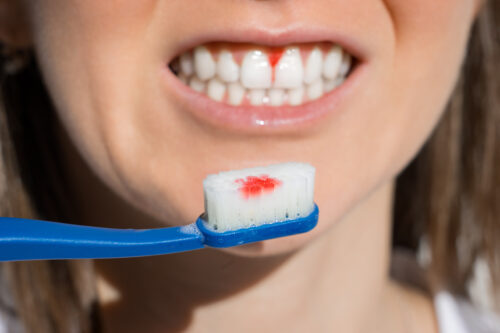
If you’re suffering from a painful inflammation of the gums, it may indicate gingivitis. By ignoring proper oral health practices, you’re more susceptible to developing gum disease. Gingivitis and periodontitis are both conditions that can directly lead to tooth loss. Therefore, knowing the symptoms to look out for and the preventative steps to avoid them is crucial. If you suspect you may have gingivitis, it’s in your best interest to enlist the help of our talented gum disease treatments/ dentists located in Basking Ridge & Morristown, NJ who can help you improve your oral health.
What is Gingivitis?
Gingivitis is the most common form of gum disease, also called periodontal disease. It’s the earliest stage of gum disease that develops when plaque, tartar, and bacteria build up on your teeth and cause an infection. Gingivitis is most commonly caused by poor dental hygiene. If you don’t keep your teeth and gums clean and healthy, you have a higher risk of developing gum disease. Good oral health habits such as brushing at least twice a day, flossing daily, and regular dental checks are crucial to prevent and reverse the damage caused by gingivitis. Gum disease can be effectively treated in the early stages.
What Are the Signs of Gum Disease?
Unlike some other oral health issues, gingivitis symptoms aren’t always easy to identify in the early stages. As the condition worsens over time, however, you may develop the following symptoms:
- Swollen, puffy, bleeding gums
- Bright red or dark gums that are darker than usual
- Shiny appearance to gums
- Receding gums
- Tender gums
- Bad breath (halitosis)
- Persistent bad taste in your mouth
- Sensitivity to hot or cold foods
- Discomfort while chewing
- Pus between your teeth and gums
- Mouth sores
- Shifting or loose teeth
- Noticeably deep pockets between the teeth and gums
- Any alterations in how your teeth fit together during a biting motion
- Changes in how your partial dentures fit
Should I Consult My Dentist?
If you believe you have gum disease, you should immediately contact your dentist. Many patients make the mistake of trying to tackle this issue alone. While some self-care and home remedies can help manage this condition, it’s best to seek professional treatment from a qualified dentist.
If you notice any symptoms of gingivitis, it’s crucial to schedule an appointment with a seasoned dentist from the Dental Associates of Basking Ridge as soon as possible. Early detection is vital. This is because you have a better chance of reversing the damage caused by gum disease and preventing periodontitis. Allow our talented dental team to help you treat gum disease.






